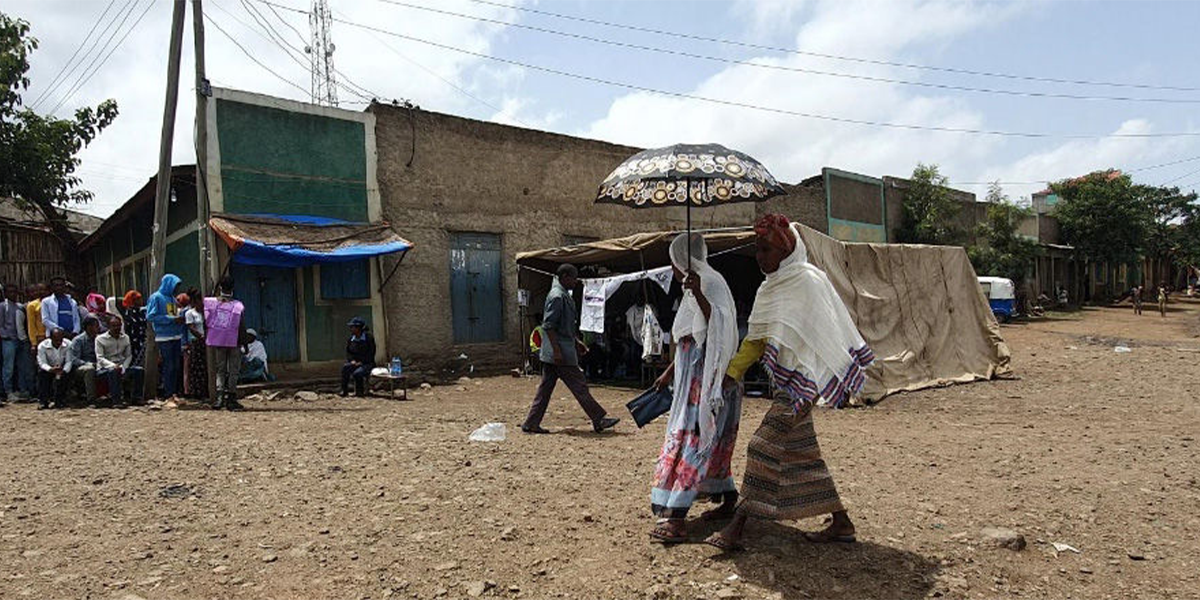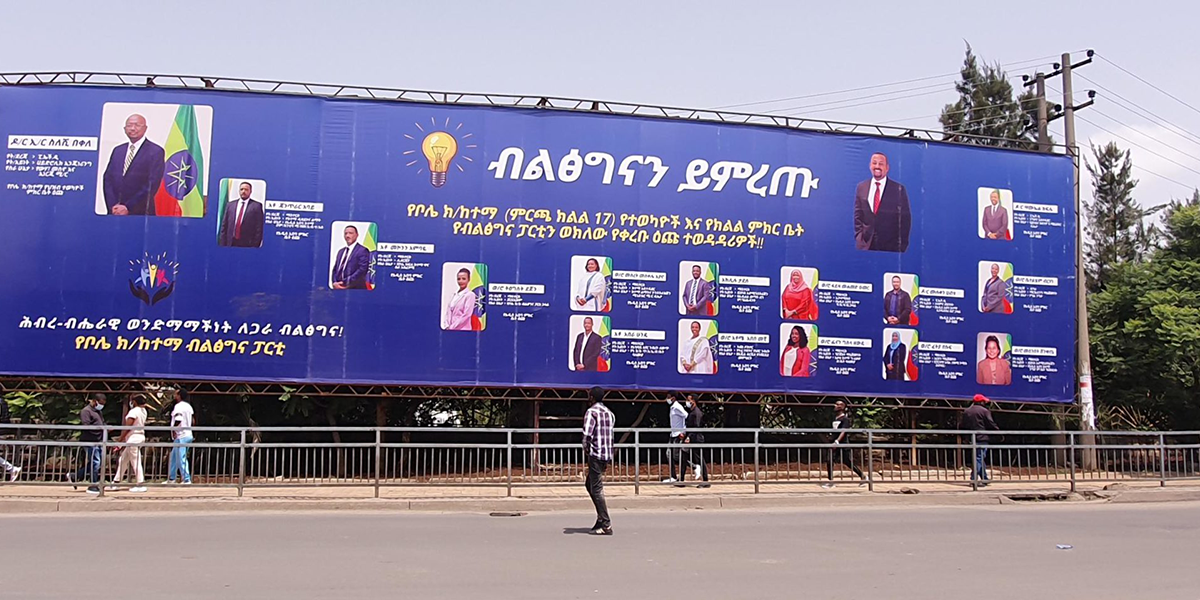News
Implications of Ethiopia's Civil Conflict
Ethiopia's prime minister is fighting for his political survival, and for the survival of his project to pacify the country. The omens are not good.

'The population is being moved out of here, and here', pointed out the UN officer on a map of Ethiopia's northernmost Tigray region, speaking just days before the June election. 'Western Tigray is being extensively depopulated', he said, tapping the location of the now 'ghost town' of Humera, once an important regional agricultural centre. As the last Ethiopian city south of the border with Eritrea and Sudan, it is considered a strategic gateway to Sudan. 'What we are seeing', he notes, 'is that Tigrayans are being “encouraged” to abandon their homes and lands in large areas of the southern part of eastern Tigray as well. What we hear repeatedly', he adds in echoes of the former Yugoslavia, 'is the need to “clean the bloodlines” of Tigray'.
Ethiopia hosted a much-delayed general election on 21 June 2021 in the midst of the coronavirus pandemic, an ongoing civil war in Tigray, instability in the Oromiya and Amhara regions and continuing frictions with its neighbours, notably Sudan. With the right set of actions led by Prime Minister Abiy Ahmed, there was hope that the elections could prove to be the start of Ethiopia's democratic transition. That hope appears to have come crashing down with the arrival of rebel Tigray Defence Forces which managed to liberate the regional capital, Mekelle, within a week of the election.
Cometh the Man, Not Cometh the Hour
Renowned for his self-confidence and energy, Abiy was appointed prime minister in April 2018 following the resignation of Hailemariam Desalegn in the face of ongoing domestic protest and violence. At the time, Abiy appeared a man on a clear mission to reshape regional relations and domestic politics, for which he quickly earned domestic sympathy and international support, being awarded the Nobel Peace Prize in 2019 for making peace with Isaias Afwerki's neighbouring Eritrea.
Abiy's rise also signalled the relative demotion of the Tigray People's Liberation Front (TPLF) as the major political power in Ethiopia. This was formally represented by his dissolution of the TPLF-dominated ruling Ethiopian People's Revolutionary Democratic Front (EPRDF) coalition of four ethnically based parties formed in 1988 to fight the 'Derg' Marxist regime of Mengistu Haile Mariam. The EPRDF was replaced by the Prosperity Party in December 2019. When Abiy postponed national elections scheduled for August 2020 on the grounds of the coronavirus pandemic, the TPLF upped the political ante by holding its own regional election the following month.
The government in Addis Ababa launched a military operation into Tigray in November 2020, aimed at decapitating the leadership of the TPLF. The coordination of Eritrean and Ethiopian forces along with Amharic irregulars and drones from the United Arab Emirates suggests that the plans for the invasion had been laid some time before.
There seems little doubt, too, that the TPLF did instigate the military conflict by attacking federal bases in Tigray in order to get their hands on the heavy weaponry that they lacked. Their own line is that this was a pre-emptive measure, given that the government was about to attack them anyhow. But underlying the TPLF rebellion was a fundamental refusal to accept the loss of power in 2018 with the installation of the Abiy government, and more basically a deluded assessment of their ability to maintain the same level of control over the national government that they had enjoyed until then.
There was absolutely no way that most of Ethiopia, and especially both Oromo and Amhara, would accept a government essentially run by a group with a base among some six percent of the population. On the government side, of course, resorting to an alliance with Eritrea in order to control Tigray was always going to be catastrophic, and resulted in the mess in which they have quickly become mired, both domestically — Eritrea is unsurprisingly not held in high regard by most Ethiopians — and internationally.
The resort to war represented a massive leadership failure in Asmara, Addis and Mekelle, one compounded by a series of miscalculations about how quickly the war would end — Abiy promised just days at the outset, and declared victory in three weeks — and by the TPLF, which apparently did not anticipate the Eritrean incursion.
The Tigrayan conflict also, however, came on the back of several years of ratcheting domestic political instability, mainly in the Oromo region, home to 35% of Ethiopia's 110-million population. While Abiy's military move against Tigray may have been aimed at reducing ethnic and political tensions by bringing the province's rebellious leadership back into line, it simultaneously unlocked a regional conflict involving Eritrea and Sudan, the former as backers of Abiy, the latter as the regional bedfellow of the rebel Tigray Defence Forces incorporating elements of the TPLF.
Shaky Economic Foundations
Growth in the Ethiopian economy, which had become used to rates of more than 10% for the last quarter century, fell during 2020 to just two percent according to the IMF. Its fiscal and foreign exchange positions are strained, inflation is topping 20% and the gap between official and black market forex rates has widened. This has slowed an ambitious infrastructure development agenda and left little room for manoeuvre. Its pivot towards manufacturing in its giant special economic zone has been slowed by the coronavirus pandemic, with manufacturing businesses complaining they are not only negatively affected by the forex shortages, but they are targeted by revenue authorities given the fiscal pinch.
Together, political and security problems would only divert resources and attention away from dealing with the crisis of development in Ethiopia, which is at the heart of these difficulties in the first instance. Ethiopia ranks 159th out of 190 countries on the World Bank's Doing Business Index for 2020, with especially poor rankings in 'getting credit' (176th) and 'protecting minority investors' (189th).
Partial Elections
Touted as the first free and fair election in Ethiopia by both government and some opposition figures, the organisation of the June 2021 election was imperfect. It could not be held countrywide given a combination of security concerns and registration problems. The contest was postponed in more than a hundred of the total 547 parliamentary seats, including 38 in Tigray, while, in a further 104, only the ruling Prosperity Party put up a candidate.
Political space was limited. The Ethiopian Human Rights Commission reported 9,000 people had been detained in 2020, for example, following outbreaks of violence after the killing of the popular Oromo singer Hachalu Hundessa which left hundreds dead. Meanwhile, on election day itself, there were reports of hindered access to ballots and acts of violence, causing delays in the voting process.
No-one expected that Abiy would lose the election; it was simply a question of the scale of his majority, whether he would obtain the two-thirds required to change the constitution and if they proceeded peacefully. This explains why the EU failed to send an election observer mission, and the US government indicated its disquiet over the poll before the event.
Tigray Bloodshed
Tigray's economy is badly broken. Largely dependent on agriculture, land has, too, become a weapon of war. Sexual violence and access to food have reportedly been weaponised to cause Tigrayans to flee, with countless harrowing stories of lives destroyed in the process.

The politicisation of access to food and aid largely explains Ethiopia's history of famine. The worst offenders have apparently been the Amharic militia and Eritrean forces, which Abiy has had to continue to rely on to subdue the rebel Tigray Defence Forces which have sprung up in the wake of the invasion. The prime minister denied the presence of the Eritreans until March 2021, and maintains that they were not invited in the first instance. Without a Status of Force Agreement, commonly agreed Rules of Engagement and a joint headquarters, the Eritreans, Amharic forces and the Ethiopians are bound only by the presence of a common enemy — the Tigrayans.
On the eve of the June election, an estimated two million Tigrayans were internally displaced, while there have been some 15,000 cases of rape in the seven months since the invasion, with an estimated five million (of seven million) Tigrayans requiring food aid.
In such an environment, at best the election could tick off the constitutional necessity of having one — and offer a step in the right direction for reform.
Root Causes
The constant tussle over access to land goes to the core of the nationalist tensions in Ethiopia, with the constant settlement and resettlement of ethnic groups and land being central to welfare given that just 15% live in urban areas. It reflects the imperative of Ethiopia addressing its own decolonisation debate — not the usual African one about the obligation of Europeans to the continent on the grounds of historical dispossession, but an internal discussion about the forces of expansion and settlement which produced modern Ethiopia, whereby many Oromiya, in particular, feel subjugated.
In this way, Tigray is not the disease in Ethiopia, but rather a symptom of more general political failure. Addis' preferred method of dealing with it, through annexation and ethnic dismemberment, has also sent a message to other regions. And making the war about the last 27 years of oppression by the TPLF has neglected an honest assessment of the role of the EPRDF in this period: 'neither democratic nor revolutionary', as one activist noted.
All this relates to seemingly inexorable demographic changes. Ethiopia's population, which was just 15 million in 1935 and 84 million in 2012, is projected to reach up to 205 million by 2050. The hope after the 21 June election was that Abiy would seize the moment and institute an inclusive national dialogue — without which the country would continue its seemingly inexorable slide towards civil conflict — to address the constitutional tension between the powers of a unitary state and ethno-nationalist provinces, the agenda for electoral reforms, the relationship with Tigray beyond just the TPLF, and key economic issues, especially around land reform. Now, with the fall of Mekelle, the chance of such a dialogue appears faint.
Abiy could still seize the initiative and surprise the world, but he will have to find the means and make the concessions to back up his rhetoric. He is firmly on the back foot, and fighting, it seems, for his political survival. And the longer the Tigrayan war goes on, the more difficult it will be to solve, and the longer the period of recovery.
This article was originally published by RUSI.


